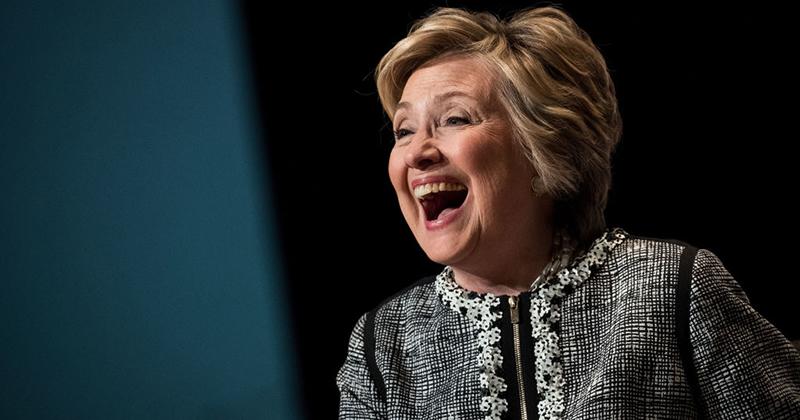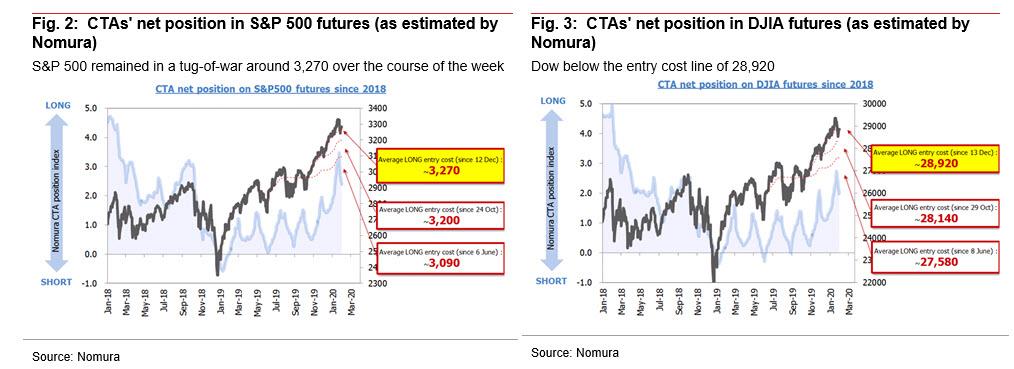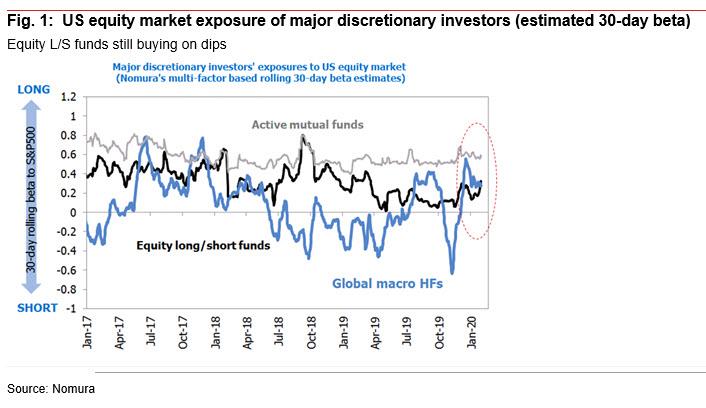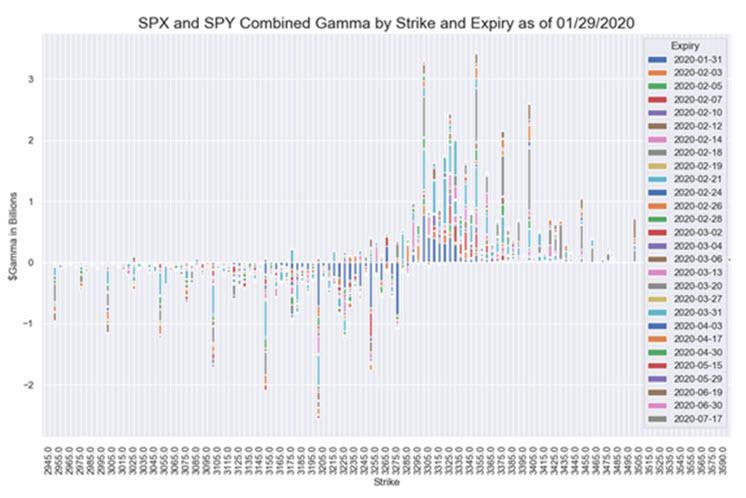Republicans in Congress recently demanded that the Justice Department step up enforcement against online pornography, and their counterparts at conservative magazines and think tanks have been proclaiming porn’s evils with renewed vigor, with right-wing intellectuals like Sohrab Ahmari and Terry Schilling writing anti-porn screeds.
But Republicans have often demonized porn during elections or scandals. (The 2016 election cycle saw Republicans declaring pornography a public health crisis.) So are the bad old days of obscenity prosecutions coming back? Or are the current calls for a crackdown just another tawdry political show?
Last week I attended the AVN Adult Entertainment Expo in Las Vegas—an annual trade conference, fan meet-and-greet, and awards show in which much of the porn industry gathers to talk shop, show off their latest products, and assess the state of the business. The performers and producers I talked with told me they’re intimately acquainted with how hypocritical politicians tease their base by performing disgust at porn.
“Politicians have always used the porn industry as a topic to be raised during election years,” says Dee Siren, an adult performer and CEO of Siren XXX Studios, which brands itself as showcasing “only real women that love real sex!”
“In my experience, politicians enjoy porn in their personal lives as much as any other group of people—if not more,” says actress Maitland Ward, who collected three AVN Awards this year. “You should ask them why they feel the need to stigmatize sex workers during election years if it goes against what they privately enjoy.”
Amberly Rothfield, a clip creator, adult marketing consultant, and phone sex operator, suggests that progress on marijuana legalization “means that politicians need to show they are strong on other issues, leaving us.” Rothfield thinks the level of anti-porn sentiment in this country has stayed the same but the anti-porn crowd is “getting louder. Meaning, same amount of people but they are doubling down on those policies as other ground is being taken.”
While no one would say that renewed obscenity convictions are around the corner, prosecutions aren’t unimaginable.
“I think it’s unlikely that there would be a conviction for obscenity,” attorney D. Gill Sperlein said in an AVN session on the legal issues facing adult entertainment. But prosecutions are often “done for political gain,” he added, and in that case “they don’t care if they get a conviction or not.”
And political stigmas express themselves in many ways. Beyond the anti-porn culture war, adult entertainers and those advising them also have more immediate, practical concerns, like the effects of FOSTA, a 2018 law that’s had a chilling effect on online content related to sex, and new labor laws like California’s AB 5, which could upend porn economics.
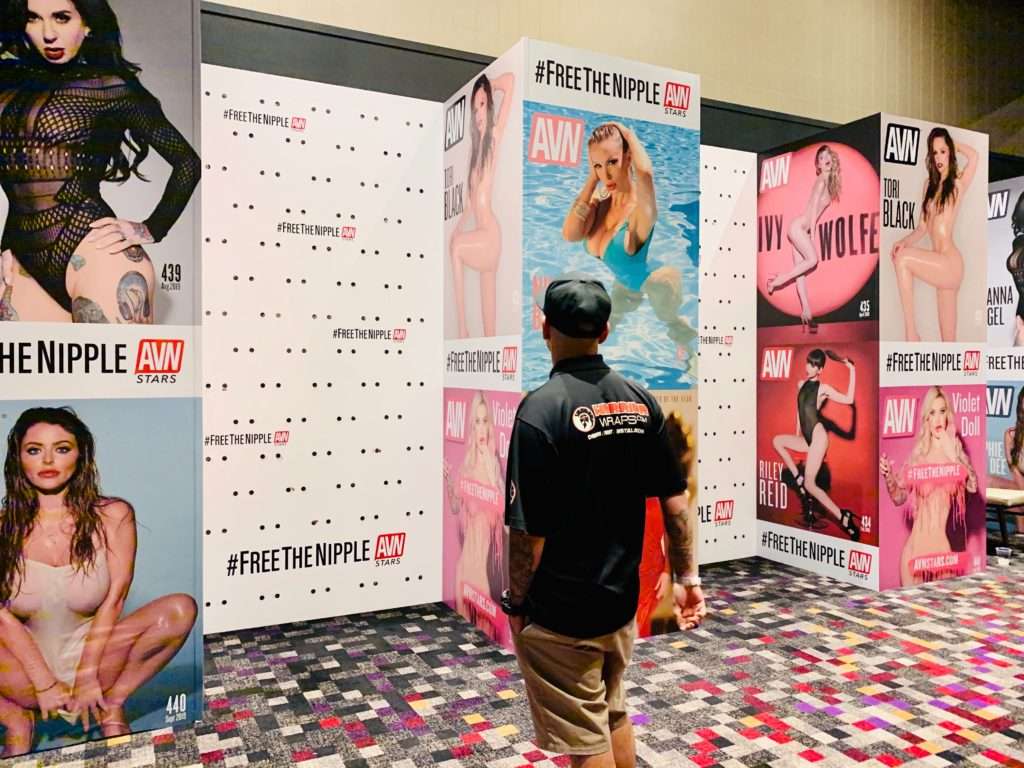
Does Anyone Really Know What Obscenity Is?
The enduring legal problem for porn producers and performers comes down to a single word: obscenity. Obscenity is one of the few types of speech exempted from protection by the First Amendment. Yet it’s never been clear precisely what it means. Federal statutes contain no explicit definition of obscenity, and guidance from courts has been maddeningly subjective.
The current legal standard was set in 1973 by Miller v. California: Obscenity is anything “the average person” using modern “community standards” would think appeals to “prurient interests,” depict or describe sexual activity “offensively,” and be without “serious literary, artistic, political, or scientific value.” Some of the right-wing anti-porn jeremiads of the Trump era have called for ramping up the legal assault on porn, arguing that courts could take a much stronger line as to what constitutes obscenity.
“I don’t think the obscenity law works today because it’s based on ‘I know porn when I see it’ [and] that’s so meaningless, especially in today’s day and age,” says John Stagliano, who has the distinction of being the last person to face a federal obscenity prosecution for mainstream, professional porn productions. A judge dismissed the charges against Stagliano and his company, Evil Angel, in 2010. (Stagliano serves on the board of the Reason Foundation, the nonprofit that publishes this website.) Since then, federal obscenity units have kept to prosecuting sexual material featuring minors.
The two Bush presidencies were more aggressive about targeting porn that featured consenting adults. In 2005, the Department of Justice created an Obscenity Prosecution Task Force to go after “the distributors of hard-core pornography“—defined as any visual depiction of uncovered genitals or of sexual activity. “The special challenges that obscenity cases pose in the computer age require an equally specialized response,” said Christopher Wray, then assistant attorney general, on May 5, 2005.
Wray is now director of the FBI. And Bill Barr, now attorney general, oversaw aggressive obscenity prosecutions during the first Bush administration. That may help explain why some conservatives think it’s time to have a go at it again.
“Change is constant, and the laws are going backwards and forwards,” says porn director and star Steve Holmes, who has worked on adult film sets (and sometimes public streets) around the world. “You have to adapt. You have to adjust.”
But adjusting can be hard with an administration as unpredictable as this one.
“Any time a conservative politician starts thinking they’re going to lose” or needs “to rile up the basethey start thinking, ‘Well, where can we go that isn’t going to hurt our interests? And pornography is usually pretty high on that list,” Sperlein saidduring the legal issues panel. But “there is a distinct difference this time: Our president owns a string of hotels, and those hotels offer pay-per-view porn. So it’s probably less likely that [obscenity prosecutions are] going to be be an issue.”
Co-panelist Allan Gelbard, a First Amendment, intellectual property, and entertainment attorney, disagreed. “I was on board with that whole analysis of Trump before he was elected,” said Gelbard. “Seeing how he’s governed, I don’t think that idea holds water anymore,” because Trump likes to rile up his base “and his base would love it” if Trump went after porn.
A film being shown in hotels owned by the president may be a pretty good sign it’s not a violation of “community standards.”
But “they’re not going to prosecute the relatively softcore porn that’s in his hotels,” suggested Gelbard. “They’re going to go after things that are believed to degrade women, or other things like that.”
When I talk to him later, Stagliano agrees, suggesting that who winds up prosecuted is “more related to the disgust emotion” than rational analysis or public safety priorities.
Stagliano mentions director Max Hardcore, who was indicted on obscenity charges in 2007 for five films that featured fisting, pee, and vomit. The films got him three years and 10 months in federal prison. “Max Hardcore got put in jail because what he was doing looked disgusting to a lot of people, because it’s not normal sex,” says Stagliano. “Not that many people are going to stand up and defend any sex that’s viewed as being abnormal or not part of the mainstream.”

How FOSTA Paved the Way For Online Censorship
“The biggest fight is against stigma, the idea in people’s heads that sexually empowered women who choose to do sex work and porn are somehow ‘tainted’ for other social roles,” says Ward, who has appeared in a mix of mainstream television and adult entertainment. It’s this stigma that fuels destructive laws and agendas.
That includes laws like FOSTA (short for the Allow States and Victims to Fight Online Sex Trafficking Act). This 2018 law gives the government a new way to go after online content related to sex, by making it a federal crime to host web content that promotes or facilitates prostitution.
“FOSTA most definitely is designed to target, among other things, adult entertainment,” Ward says. “It’s censorship legislation,” making digital platforms legally liable “for having content that is very vaguely defined and subject to the random whims and attitudes of officials.”
Vagueness is one of FOSTA’s big problems. It fails to differentiate between sex trafficking and prostitution. It fails to distinguish between conduct and speech. And it wraps the whole package in language so muddled and penalties so severe that web platforms have an incentive to crack down on all sorts of sexually-themed content.
“Even though I am not a full-service sex worker”—that is, someone who engages in sexual activity directly with private clients—“I have had to deal with the censorship that came along with FOSTA,” says Allie Even Knox, a fetish performer who also works as vice president of sales at the Ethereum-based payment processor SpankChain. It’s “limited me [in] services that I need to have for my business,” such as email list management and photo storage, because many popular sites won’t accept accounts related to sex.
Knox tells me her Instagram account has been shut down three times, even though she doesn’t post nudes, and so has “every single cash app that you could imagine, and even a crypto wallet.”
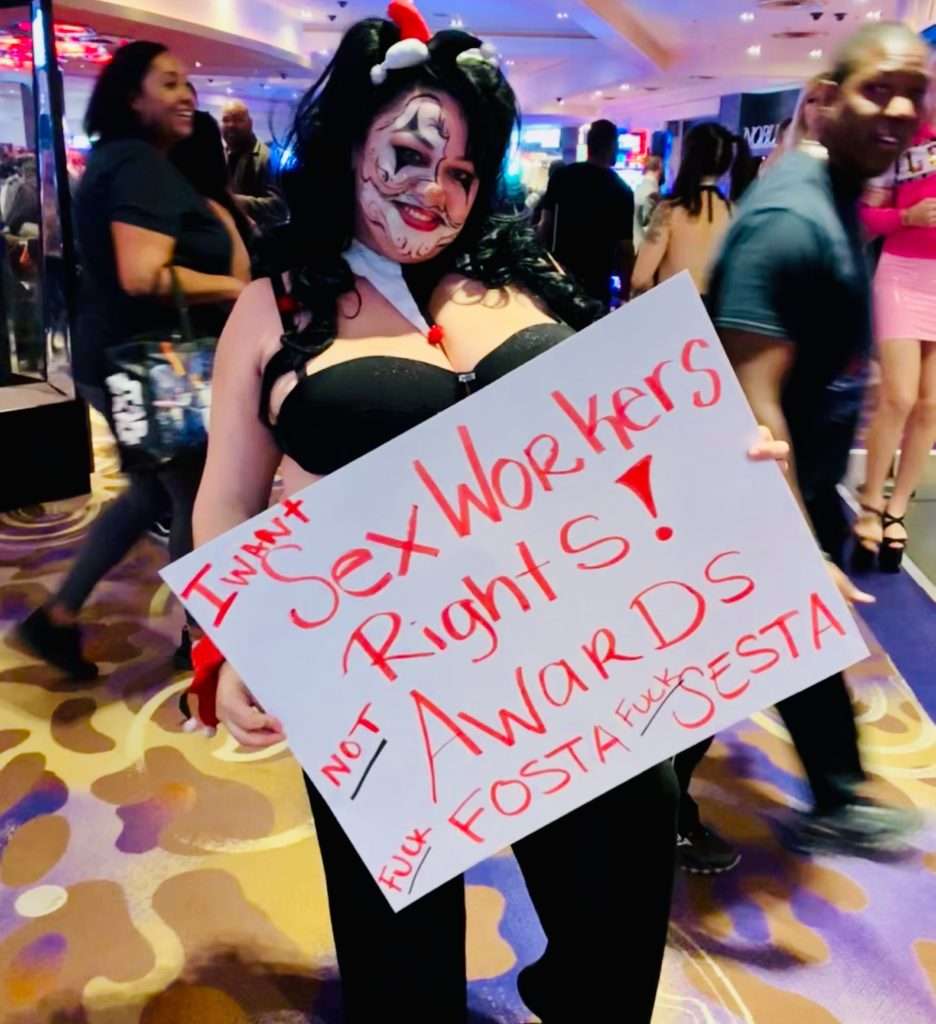
“Even though I was just accepting tips or tributes through the system, or selling panties or content, whatever, the platforms have taken a much tighter stance and will shut you down merrily for existing,” she adds. “This bill has made it much harder for me to accept payment for my legal work.”
On the night of the AVN Awards, as the guests of honor walked the red carpet, someone circled the periphery holding a sign that said “I want sex workers rights! Not awards” and, under that, “Fuck FOSTA. Fuck SESTA.” (SESTA is the acronym for a similar bill that started in the Senate, and the bill that passed is often called SESTA-FOSTA.)
Porn performers and workers in other legal sex industries sometimes strive to distance themselves from criminalized sex work such as prostitution. But Kaytlin Bailey of the group Decriminalize Sex Work, which is pushing to remove criminal penalties for prostitution in several states, says the group’s booth got a good reception at the AVN Expo.
“We are all stigmatized as sex workers,” says Bailey. “There are a lot of people here that told me that SESTA-FOSTA was the thing that got them to contact their senator or the first time, or got them to vote or pay attention to politics.”
On the legal issue panel, Sperlein said he hopes prostitution decriminalization will follow the path of cannabis in the U.S. “People really do believe that the government shouldn’t get involved in what people do in their personal lives,” he says. “It may not be that easy, but I’m hoping that it follows that trend.”
He’s been working with a group of advocates and a California lawmaker to get a decriminalization bill—and research to back it up—ready for 2021.
“Officials are often lobbied by religiously motivated groups that consider all sex work to be ‘human trafficking’ and all porn to be ‘exploitation,'” says Ward, commenting on FOSTA. “But I’m not worried too much because Americans love freedom and hopefully they can see censorship for what it is.”

Will California’s Gig Economy Law Be Porn’s ‘Armageddon’?
Porn faces another legal threat. A.B. 5—California’s new law regulating the gig economy—is “armageddon in some ways” for the state’s porn industry, said longtime AVN writer Mark Kernes on the legal issues panel.
Many adult entertainment companies rely on talent and crew employed as independent contractors, not full-fledged employees. And for porn performers these days, it’s the norm not just to contract with one or more studios but to make money via webcamming, video clip sales, and other online platforms. Having multiple income streams that don’t depend on a few big gatekeepers makes the work safer and puts performers in more control.
A.B. 5, and the copycat legislation it’s spawning in other states, threatens that.
These laws are presented as ways to protect workers from being taken advantage of by companies who get a significant number of hours out of them without classifying them as full employees. But in practice, they take options away from freelancers, consultants, gig workers, and independent contractors, who are now limited in their options, while giving companies no incentive to suddenly hire all their contractors and incur huge additional costs.
A.B. 5 “could reclassify any performer working for a studio as that studio’s employee, no matter how many different studios you shoot for,” warned the Adult Performer Advocacy Committee and the Free Speech Coalition in pamphlets handed out at the AVN Expo.
Because A.B. 5 contains exemptions for business-to-business relationships, the groups suggest performers form their own corporations in order to continue to be allowed to be paid as an independent contractors. “Your employer would now have a contract with your corporation instead of with you as an individual,” they explain.
Rothfield points out that “exceptions are being written in for cam performers and the like,” but A.B. 5 “has made many adult sites feel they have to hire cam girls as employees to be compliant,” which “leaves many part time cammers scared about their income.”
Bascially, laws like this make it harder for porn performers to work as independent contractors for multiple platforms, giving them less leverage and fewer options and creating greater risk for exploitation.

The Right to Look at Stronger, Crazier Stuff
Despite the current climate of panic and fear surrounding “sex trafficking” and, by extension, all forms of sex work, we’ve come a long way on this front from just a few decades ago.
As an example: When Good Vibrations founder Joani Blank first tried to place ads for the company in the 1980s, she could “not buy ads in most places,” author and educator Carol Queen told a crowd at an AVN panel on sex tech. “She couldn’t even in Playboy—Playboy rejected her ad. And then the same year, Ms. Magazine, the magazine of record for modern feminism, rejected it.” Just “getting the word out” about anything related to sex was difficult, Queen said.
Some people say we’ve come too far.
As a father, Stagliano says, “I understand why the public is concerned and wants the government to step in and make it somewhat harder” to access porn online. But he also believes “it’s my responsibility to control what my children look at.”
Adults should have “the right to choose to look at stronger, crazy stuff” if they wish, he adds.
Whether these rights persist depends on breaking down stigma, Rothfield argues. She hopes to see more people “come out of the ‘new closet’ and admit to being sex workers in the past and show politicians just how many of us are. Adding them to our numbers, I believe is the only way to ensure our rights do not get trampled on.”
The advent of accessible, low-budget ways to create adult content, combined with the proliferation of ways to distribute that content, has revolutionized the porn industry for performers in a way that’s only starting to be realized. And according to those in the industry, it stands to bring even more positive changes—if government can get out of the way.
“The far right—just like in the ’80s—wants a war on everything, including a war on porn,” Siren says. “But we will not go away and will fight for our freedoms.”

from Latest – Reason.com https://ift.tt/31fvlUt
via IFTTT





